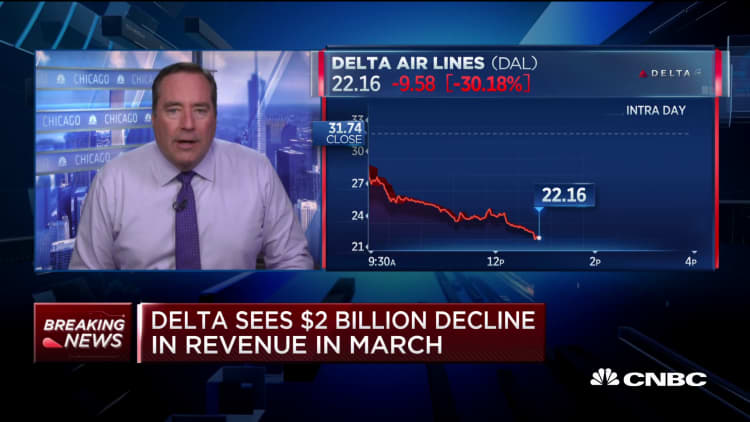U.S. airline stocks plunged to new multi-year lows Wednesday as carriers further cut costs after coronavirus devastated demand for flights and they continue to plead for billions in government aid.
Delta Air Lines said Wednesday that it plans to cut its flying by an unprecedented 70%, on a year-over-year basis, after March revenue fell nearly $2 billion short of the same month last year as bookings drop and cancellations pile up.
The Atlanta-based carrier is also halting capital spending, including for new aircraft, and parking "at least" half of its fleet.
April's revenue drop could be even worse, Delta warned. The reduced flying will last "until demand starts to recover," CEO Ed Bastian told employees.
"Our international operation will take the largest reduction, with over 80% of flying reduced over the next two to three months," he said.
The airline industry has been among the hardest-hit industries amid the rapid spread of COVID-19, as consumers stay home, scrapping vacations and lucrative business travel.
United, American, JetBlue, Southwest and others are, like Delta, slashing their flying, asking employees to take unpaid leave, freezing hiring and parking hundreds of planes, a trend that is weighing heavily on aircraft makers like Boeing and Airbus. American, for example, it is offering workers up to 12 months of unpaid leave. Employees can also leave the company entirely and buy health insurance at the same premiums as staff if they have worked for the airline for 15 years or more.
On Thursday, American said it secured a $1 billion delayed-draw loan to help shore up funds for the crisis and that it has $8.4 billion in available liquidity.
But airlines say government support is needed to combat the drop in bookings.
"These are extraordinary circumstances, and additional support is necessary to protect jobs and ensure that the flying public can continue to rely on our industry after the crisis ends," Nate Gatten, American's senior vice president for government affairs, wrote to employees late Wednesday. "The financial assistance we seek is to support our team members as we weather this unprecedented storm together." American's CEO Doug Parker traveled to Washington D.C. this week and has spoken with President Donald Trump, Treasury Secretary Steven Mnuchin and several lawmakers, Gatten said.
Despite airlines' cost-cutting measures, executives signaled more pain is ahead as bookings drop precipitously.
JetBlue said Wednesday that on an average March day the carrier takes in about $22 million from bookings and fees and that this month that's dropped to an average of less than $4 million a day. At the same time, the New York-based airline has been issuing credits of more than $20 million to customers who have cancelled their trips.
"If you do the math, $4 million per day does not come anywhere close to covering our daily expenses," the airline's CEO Robin Hayes and COO Joanna Geraghty told crewmembers. "It is hard to predict how long these conditions will last and how much more challenging the environment may become."
Several airlines Wednesday posted their largest one-day percentage declines on record and fell to new multi-year lows. Among them: American which dropped 25% to end at $11.65, Delta, which fell 26% to close at $23.49, and JetBlue, which lost nearly 20% to $7.660. United fell more than 30%, its second-biggest one-day percentage drop, to close at $21.38.
U.S. carriers have requested more than $50 billion in government aid to weather the crisis, which executives have said is worse than the Sept. 11 terrorist attacks, because there is no end in sight to the disruption.
Delta and its competitors are asking employees to take unpaid leave. So far, 10,000 Delta employees have volunteered — more than 10% of the Atlanta-based airline's full-time equivalent workers — but it's still not enough. CEO Bastian urged employees "to seriously consider whether a temporary leave makes sense for you and your family right now. Please remember that you will continue to have access to your health and flight benefits while on leave."



